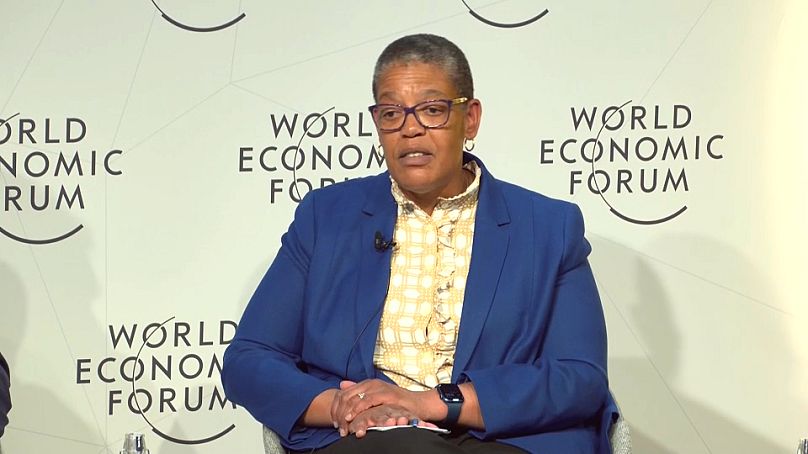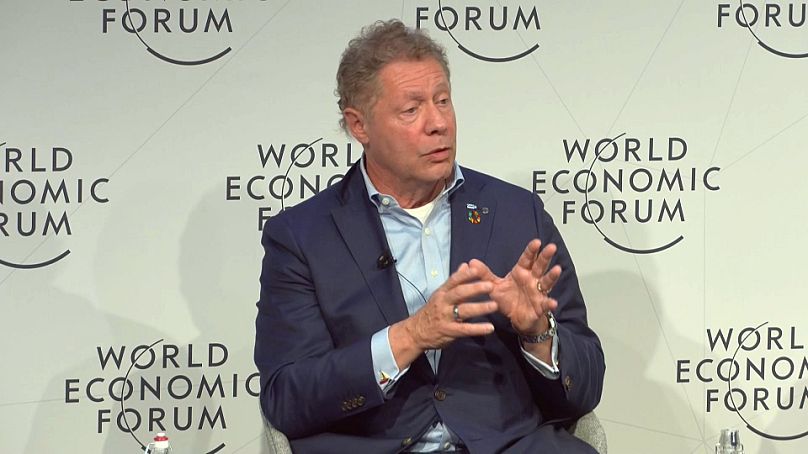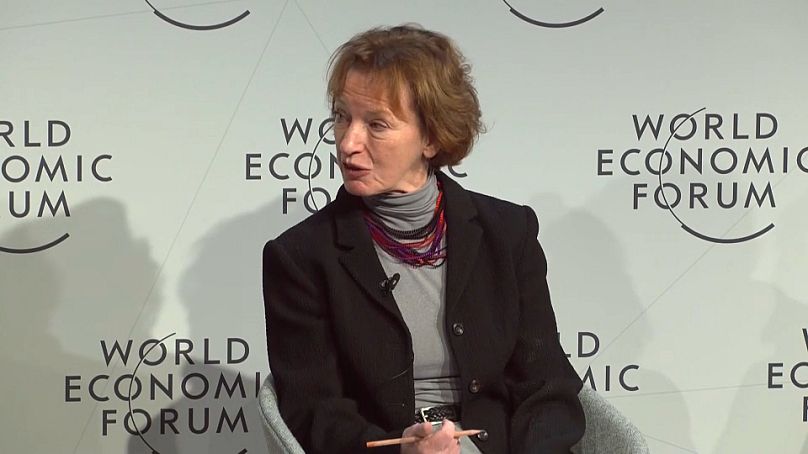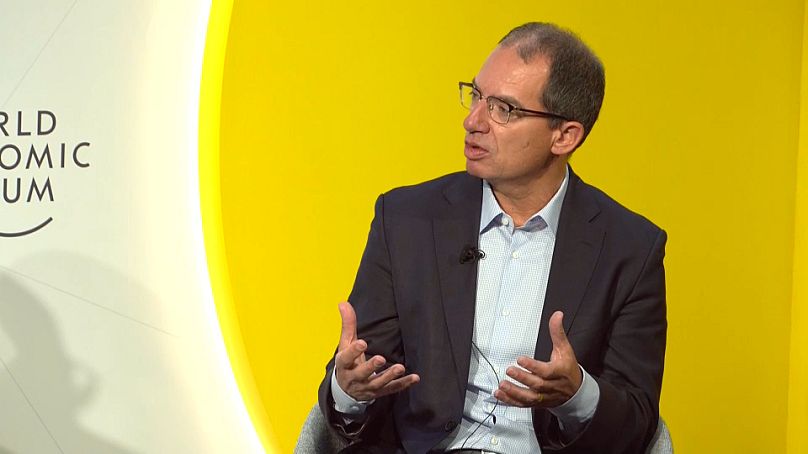Euronews spoke to global health leaders about the state of the Covid-19 pandemic, vaccine delivery, health governance and much more.
This year's annual World Economic Forum in Davos marks the biggest gathering of world leaders since the Covid-19 pandemic.
It was three years ago when in January 2020, the World Health Organization (WHO) declared a public health emergency of international concern.
Despite efforts to learn lessons from it - and some world leaders declaring the end of it - the pandemic still represents a major health risk and remains far from over.
To evaluate the state of the pandemic, the increase in cases globally, and discuss the consequences on the healthcare system worldwide, Euronews' Sasha Vakulina spoke to Maria Leptin, President of the European Research Council, Seth Berkley Chief Executive Officer at GAVI, the Vaccine Alliance, Stéphane Bancel Chief Executive Officer at Moderna and Michelle Williams, the Dean of the Faculty at Harvard Chan School of Public Health.
The current state of the pandemic
Michelle Williams: "Advances in therapeutics and vaccines have really allowed us to reopen our society," said Michelle Williams. "And I think part of the enthusiasm comes from the fact that we are able to have gatherings like this again after a long period of disruption."
"So, setting the context, we still in the United States have 526 deaths...per day, from Covid. And that's up since November, October, where we were in the four hundreds. Now, what's really disappointing is nine out of ten of those deaths could be averted if we took our vaccines and boosters and practiced the other behavioural aspects, ventilation, mask-wearing when appropriate, distance and so on. And so for me, as a public health person, knowing that we could avert nine out of ten of those deaths reminds me of the fact that we have to avoid prematurely talking about this pandemic being over," she added.
"I also think that... when we talk about context, we must also discuss the more chronic implications of this pandemic. We must discuss the fact that there, in the US alone, over 174,000 Covid infants will have a life course that's impacted by this pandemic. We also have to consider the fact that long Covid is a reality, and it's not only going to be impacting individuals and families, but the economic impact of long Covid as quantified by Larry Summers and David Cutler, both of Harvard, is that it's going to cost us $3.7 trillion (€3.4 trillion). Our healthcare system is still in distress. And what I hope people will understand is the vaccine not only protects individuals from transmission and severity, but it protects our health systems. We're able to have a functional, or almost functional, health system because we don't have the kinds of severe disease that we were facing in 2020. And we need to also recognise that our health systems have to recover as well. We have burnout from our healthcare workers and we have case mixes of chronic diseases that are worse now and require more intensive medical intervention than before."
The Covid-19 vaccine delivery partnership and vaccine delivery in low- and middle-income countries
Seth Berkley: "Three years ago, we sat here in Davos and we didn't know where this was going to go. There were some political leaders saying, you know, it's going nowhere. But Stéphane was part of the conversation and Richard Hatchett and I sat down and said, [during] the last pandemic with flu, the developing world got no vaccines. They were all bought up by wealthy countries. So, we knew that was what was going to happen if this turned into a global pandemic. And so, we started this concept of COVAX, which we brought lots of other people into, and the idea was to try to solve that problem."
"First of all, the science was amazing. 327 days! If you had asked us, we had thought maybe we could get there in 18 months, two years. So [it's] extraordinary, you know, advancements in the science. But on the policy side as well. We did our first dose in the developing world 39 days after the first dose was done in a wealthy country. Of course, it should be [on] the same day. But that's... a record. And what we were able to do then was to bring doses to the developing world."
"Now, it wasn't smooth. It didn't go well. But, in the first year, we had put a goal together of 950 million doses, because that's what we thought we could get for low- and lower-middle-income countries. And we ended up with about 930 million doses. So, we came close to that and we intensified a programme both providing finance and technical assistance. And today there are seven countries with less than 10% coverage. And, as you can imagine, six of those are quite fragile countries with fragile health systems. The problem we have right now is since the beginning of 2022, we've had enough vaccines to provide whatever countries want."
"The challenge has been getting the demand. Part of it is the world says, you know, we're done with Covid. Of course, the virus is not done with us, as Michelle said. And, what we really need to do is make sure that policymakers understand that we're continuing to see new variants...So, the best thing we can do is use the prevention methods, but also make sure we vaccinate our high-risk populations so they're protected against severe disease and death."
Vaccine development and adoption in regard to different variants and sub-variants
Stéphane Bancel: "We have plants in the US and in Switzerland. We've shown this summer that we are able to adapt to variants very quickly. If you think about it...in the US, Peter Marks told us on 28 June [that] we want for the US to have a BA.5 Omicron booster. And by early September, on Labour Day weekend, it was in US pharmacies. 60 days! Which...in the old world of vaccines would usually be unthinkable. So, we keep on working on technologies to improve that."
"The other piece that we are working on also - because Seth and I had many, many discussions over the last few years - is how do we build manufacturing capacity around the world? We had a lot of export restrictions during the pandemic, which was really painful for obvious reasons, even from countries who say they will not limit exports. Trust me, they were. And so we're very excited now that we are building a factory in Canada. We already broke ground in the fall. We're building a factory in Australia. We are going to start a factory this quarter in the UK and we're also going to start building a factory in Kenya. We're talking to a couple more countries because I would really like every continent to have MRNA capacity because the amazing thing about MRNA is you can use the same facility, the same plant, the same machines, to make any vaccine you want."
The issue of science denial
Maria Leptin: "Perhaps interestingly, two of the countries which were most successful in getting good coverage of vaccination based this not at all on getting their citizens to try and understand the science. One is Bhutan, where they were very successful in preparing a campaign and (they were) involved. They were sensitive to the country's needs, to the citizens’ needs, involved in informing the religious establishment and in fact, [in] using them in finding the right time and date. And they got fantastic coverage. No science was explained. The other example I know of is Portugal, where the campaign was handed to a retired army general. And the army general just treated the country as his troops and he rallied the troops. He declared it as a war that the country in patriotic passion was going to fight together. And they [were] up there! I think they were leading in Europe, if not the world."
"The trouble is that many citizens don't understand uncertainty as part of the scientific method. And if I say today, 'this is my best belief' with that uncertainty and somebody else says tomorrow, 'you didn't do that experiment right'…That's the way we are! So we’ve got to go so profoundly into educating citizens about the scientific method if we want better trust in science. And the bad news is, who's it going to be? It's not going to be us because we're the ones who are mistrusted."
Michelle Williams: "What you have to do if you're really interested in communicating information that will motivate people to change their behaviour, you have to take the approach of meeting them where they are, explaining it and presenting the information in a way where they will adopt the desirable behaviour and feel good about it. And maybe that was the secret sauce to what happened in Portugal and in Bhutan. Health communicators and scientists worked to communicate the risks and what we understand today... All of us have to begin to realise that we have to stop our professional scientific speak, or engage others who can translate for us and meet people where they are. If we do that, it will be the stepping stone of building trust."
Seth Berkley: "What you didn't mention was the intentionality, the politicisation of the process. There were also attacks that were done. There were bots in social media that were putting out misinformation on both sides. And lastly, and this is what's completely different, is today a rumour spreads literally at the speed of light."
Health governance: How can it be improved?
Michelle Williams: "There has to be mindset shifting in what it means to engage in multilateral agreements around global health issues. And there have to be real improvements in the infrastructure and the finances and the workforce. And that's going to take leadership and it's going to take a commitment to true multilateral engagement. We have to have people who are committed to the exercise of global health diplomacy. And it's a science and an art, but it also has to be a commitment for all humanity, because we know and we knew this since 2014 with Ebola, that it only takes 8 hours for a threat from over there to be a threat here."
"And so, we have to realise not just in rhetoric but in practice, the science is really important - I am a molecular biologist and an epidemiologist - but governance has to realise that they have been underfunding science in understanding human behaviour and they have underinvested in the implementation of the scientific knowledge and the tools that we have. So, we have to get to a level where governance is appreciating funding communities, funding regional health officers, equipping them with tools and engaging in creating a safety net that goes from knowledge creation and creation of vaccines and therapeutics to explaining and motivating and cultivating that environment of trust for adopting behaviours that promote health for individuals, communities, families in the world."
Seth Berkley: "One of the things we learned is there were countries who were supporting us, giving us money, cheering us on, and then going to the countries that were producing the vaccines and buying them for themselves and using them. A national government is supposed to protect its population. That's its job. And when we said you're only safe if we're all safe, what we were talking about is, yes, protect your high-risk populations, but then protect other high-risk populations. And instead, many countries said, well, you know, forget about others, we're just going to do our own. And then we saw these waves of disease and people realised it is really a global commons."
Stéphane Bancel: I still believe we can do much better, with a lot of things we've learned about also how we scale the companies. And so, one of the things, for example, we are doing... is trying to get into the clinic all the 15 vaccines against the 15 high-priority viruses defined by WHO and CEPI to be able to get clinical data on those. Because if we had known the dose of a vaccine against the coronavirus in January 2020, we might have saved another three months. So, think about the number of lives that could have been saved with a vaccine launched, you know, in August versus, you know, in December."
"What I worry about now is a lot of countries are forgetting the pandemic is still ongoing. Still, a lot of people are dying every day, but a lot of governments have moved to other things. And that's a problem because we need investments in public health infrastructure, in healthcare workers, in genomic surveillance. There are so many pieces that need to happen."
How can we be better prepared for future pandemics?
Maria Leptin: My plea is: keep investing in the basic science. Let's not forget that. The next pandemic may be different. We don't even know. Nature can come up with anything. We're prepared in many ways. I want to say: don't restrict funding to the fundamental sciences in their full breadth. You never know what we'll need for the next outbreak.














